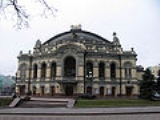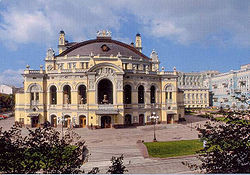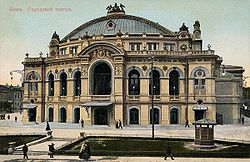
Kiev Opera
Encyclopedia

Taras Shevchenko
Taras Hryhorovych Shevchenko -Life:Born into a serf family of Hryhoriy Ivanovych Shevchenko and Kateryna Yakymivna Shevchenko in the village of Moryntsi, of Kiev Governorate of the Russian Empire Shevchenko was orphaned at the age of eleven...
in Kiev
Kiev
Kiev or Kyiv is the capital and the largest city of Ukraine, located in the north central part of the country on the Dnieper River. The population as of the 2001 census was 2,611,300. However, higher numbers have been cited in the press....
.
Early History: 1867 - 20th century
Established in the summer of 1867 by Ferdinand Berger (? - 1875). Berger succeeded in inviting many talented singers, musicians, and conductors, and the city council (duma) had offered the newly created trouppe to use the City Theatre (constructed in 1856, architect I. Shtrom) for their performances. Officially, the theatre was named the City Theatre but was most commonly referred to as the Russian Opera. The day of the first performance, November 8 (October 27 old style), 1867 was made a city holiday. The performance of the opera Askold's Tomb by Alexey VerstovskyAlexey Verstovsky
Alexey Nikolayevich Verstovsky was a Russian composer, musical bureaucrat and rival of Mikhail Glinka.-Biography:...
was the troupe's debut. The initial success is attributed to the vocal talents of that time of O. Satagano-Gorchakova, F. L'vov, M. Agramov but also to the captivating plot taken from some principal pages of the ancient history of the city.
Early performances were mostly Russian operas, including Ruslan and Lyudmila by Mikhail Glinka
Mikhail Glinka
Mikhail Ivanovich Glinka , was the first Russian composer to gain wide recognition within his own country, and is often regarded as the father of Russian classical music...
, Rusalka
Rusalka (Dargomyzhsky)
Rusalka is an opera in four acts, six tableaux, by Alexander Dargomyzhsky, composed during 1848-1855. The Russian libretto was adapted by the composer from Pushkin's incomplete dramatic poem of the same name...
by Alexander Dargomyzhsky
Alexander Dargomyzhsky
Alexander Sergeyevich Dargomyzhsky was a 19th century Russian composer. He bridged the gap in Russian opera composition between Mikhail Glinka and the later generation of The Five and Tchaikovsky....
, Maccabees by Anton Rubinstein
Anton Rubinstein
Anton Grigorevich Rubinstein was a Russian-Jewish pianist, composer and conductor. As a pianist he was regarded as a rival of Franz Liszt, and he ranks amongst the great keyboard virtuosos...
and The Enemy's Power by A. Serov
Alexander Serov
Alexander Nikolayevich Serov – was a Russian composer and music critic. He and his wife Valentina were the parents of painter Valentin Serov...
, as well translated European operas including The Barber of Sevile by Rossini
Gioacchino Rossini
Gioachino Antonio Rossini was an Italian composer who wrote 39 operas as well as sacred music, chamber music, songs, and some instrumental and piano pieces...
, The Marriage of Figaro by Mozart, The Magic Archer by Weber
Carl Maria von Weber
Carl Maria Friedrich Ernst von Weber was a German composer, conductor, pianist, guitarist and critic, one of the first significant composers of the Romantic school....
, Lucia di Lammermoor by Donizetti
Gaetano Donizetti
Domenico Gaetano Maria Donizetti was an Italian composer from Bergamo, Lombardy. His best-known works are the operas L'elisir d'amore , Lucia di Lammermoor , and Don Pasquale , all in Italian, and the French operas La favorite and La fille du régiment...
, and also operas by Giuseppe Verdi
Giuseppe Verdi
Giuseppe Fortunino Francesco Verdi was an Italian Romantic composer, mainly of opera. He was one of the most influential composers of the 19th century...
, which became the favorite of the Kievites. Kurt Adler
Kurt Adler
Kurt Adler was an Austrian classical music conductor, chorus master and pianist with a European musical education. He was best known as the chorus master and conductor of the Metropolitan Opera in New York City from 1943 to 1973...
(First Conductor), from 1933-1935.
On February 4, 1896, after a morning performance of Eugene Onegin by Tchaikovsky
Pyotr Ilyich Tchaikovsky
Pyotr Ilyich Tchaikovsky Pyotr Ilyich Tchaikovsky Pyotr Ilyich Tchaikovsky (Russian: Пётр Ильи́ч Чайко́вский ; often "Peter Ilich Tchaikovsky" in English. His names are also transliterated "Piotr" or "Petr"; "Ilitsch", "Il'ich" or "Illyich"; and "Tschaikowski", "Tschaikowsky", "Chajkovskij"...
, a fire erupted from the unextinguished candle in the theatre. The fire consumed the whole building within several hours. One of the largest musical libraries in Europe along with numerous costumes and stage props of many performances were lost during the fire. After the fire of the City Theatre, the troupe performed on other stages for several years, including Bergonie's Theatre (now the National Theatre of Russian Drama named after Lesya Ukrainka
Lesya Ukrainka
Larysa Petrivna Kosach-Kvitka better known under her literary pseudonym Lesya Ukrainka , was one of Ukraine's best-known poets and writers and the foremost woman writer in Ukrainian literature. She also was a political, civil, and female activist....
), Solovtsov's Theatre (now the National Theatre named after Ivan Franko
Ivan Franko
Ivan Yakovych Franko was a Ukrainian poet, writer, social and literary critic, journalist, interpreter, economist, political activist, doctor of philosophy, the author of the first detective novels and modern poetry in the Ukrainian language....
) and even on the arena of the famous Krutikov's Circus.
Early 20th century
After the fire, the City Council had announced the international competition to design a new building for the Opera Theatre in Kiev. The winning proposal was by Victor Aleksandrovich Shreter. The exterior was designed in Neo-Renaissance style and had accounted for the needs of the actors and the spectators. The interior was redesigned in a classical style and called Viennese Modern. However, his greatest achievement is considered to be the stage - one of the largest in Europe designed to the latest engineering standards.
In the first decade of the 20th century, the Kiev Opera Theatre attracted the most outstanding Ukrainian and Russian singers, including O. Petlyash, P. Tsecevich, K. Voronets, M. Medvedev, K. Brun, O. Mosin and O. Kamionsky and famous opera stars from the West often came on tours. Several unusual for the time performances took place on the stage: Die Walkure by Wagner
Richard Wagner
Wilhelm Richard Wagner was a German composer, conductor, theatre director, philosopher, music theorist, poet, essayist and writer primarily known for his operas...
, Sadko by Rimsky-Korsakov
Nikolai Rimsky-Korsakov
Nikolai Andreyevich Rimsky-Korsakov was a Russian composer, and a member of the group of composers known as The Five.The Five, also known as The Mighty Handful or The Mighty Coterie, refers to a circle of composers who met in Saint Petersburg, Russia, in the years 1856–1870: Mily Balakirev , César...
and Mefistofele by Boyto.
As Kiev began to grow and with the conclusion of World War I
World War I
World War I , which was predominantly called the World War or the Great War from its occurrence until 1939, and the First World War or World War I thereafter, was a major war centred in Europe that began on 28 July 1914 and lasted until 11 November 1918...
, the Kiev Opera occupied a special place in the USSR and the world. The Kiev Opera Theatre was considered to be one of the most prestigious in Ukraine and Russia.
During the intermission of a performance on , Dmitry Bogrov
Dmitry Bogrov
Dmitry Grigoriyevich Bogrov was the assassin of the Russian Prime Minister Pyotr Stolypin.Born Mordekhai Gershkovich Bogrov...
killed Prime Minister
Prime Minister of Russia
The Chairman of the Government of the Russian Federation The use of the term "Prime Minister" is strictly informal and is not allowed for by the Russian Constitution and other laws....
Pyotr Stolypin
Pyotr Stolypin
Pyotr Arkadyevich Stolypin served as the leader of the 3rd DUMA—from 1906 to 1911. His tenure was marked by efforts to repress revolutionary groups, as well as for the institution of noteworthy agrarian reforms. Stolypin hoped, through his reforms, to stem peasant unrest by creating a class of...
.

